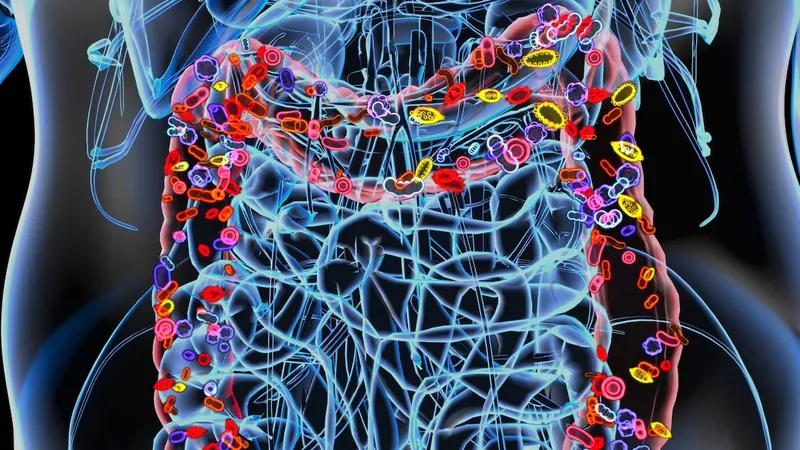
Gut Bacteria Linked to Severity of Ankylosing Spondylitis: A Game-Changer in Autoimmune Research!
2024-10-25
Author: Li
Recent Research Overview
Recent research published in *Frontiers in Cellular and Infection Microbiology* sheds light on the compelling relationship between gut bacteria and the severity of ankylosing spondylitis (AS), a chronic autoimmune condition. The study highlights how changes in gut microbiota can potentially influence the progression and severity of this inflammatory disease.
The significance of gut health has been increasingly recognized in recent years, and this study adds to a growing body of evidence suggesting that the gut microbiota may play a critical role in the pathophysiology of ankylosing spondylitis. The authors of the study analyzed 47 research papers, which included data on 2,494 AS patients and 1,885 healthy controls, revealing some alarming differences in gut bacterial diversity between the two groups.
What Did They Find?
The findings indicate a significant reduction in α-diversity—a common indicator of gut health—among AS patients when compared to healthy individuals. Specifically, using metrics like the Chao1, Shannon, and Simpson indices, researchers noted stark differences: Chao1 Index: Decreased in AS patients (SMD: -0.44) Shannon Index: Significantly lower in AS patients (SMD: -0.27) Simpson Index: Also reduced (SMD: -0.30)These results suggest a decline in microbial diversity, an indication that something is amiss in the gut microbiome of those suffering from ankylosing spondylitis.
Interestingly, patients who had not yet received treatment displayed a marked decrease in microbial diversity compared to those who had been treated with disease-modifying antirheumatic drugs (DMARDs) or nonsteroidal anti-inflammatory drugs (NSAIDs). This suggests that treatment may help restore some level of gut health.
Active vs. Inactive Disease
A deeper analysis distinguished between patients with active disease and those with inactive disease, revealing that individuals with active symptoms had significantly lower levels of beneficial gut bacteria. This continued degradation of the gut microbiome raises concerns about the broader implications for disease management.
The analysis also pointed to specific bacteria types: Bacteroidetes were found at higher levels, while Bifidobacterium, known for its beneficial effects on gut health, was present in lower quantities. These findings raise critical questions about how these shifts in gut bacteria might further exacerbate inflammation associated with ankylosing spondylitis.
Implications for Future Research
The study’s authors stress the importance of understanding how gut health correlates with autoimmune diseases like AS. "Our findings indicate a potential dysbiosis that may contribute to the disease's inflammatory processes,” they note. This suggests that microbiome-targeted therapies could become an essential part of holistic treatment strategies geared toward managing the disease.
As researchers continue to investigate the gut-brain-axis and the effects of microbiome alterations on immune regulation, patients and healthcare providers alike are urged to pay closer attention to gut health as a potential therapeutic target in treating ankylosing spondylitis.
In conclusion, these findings not only highlight the interconnectedness of gut health and autoimmune conditions but also pave the way for innovative therapeutic avenues that could transform the treatment landscape for ankylosing spondylitis. The next few years could hold significant breakthroughs as we delve deeper into the microbial mysteries of the gut!
Stay tuned for more updates as researchers unravel the complex role of the microbiome in health and disease!



 Brasil (PT)
Brasil (PT)
 Canada (EN)
Canada (EN)
 Chile (ES)
Chile (ES)
 España (ES)
España (ES)
 France (FR)
France (FR)
 Hong Kong (EN)
Hong Kong (EN)
 Italia (IT)
Italia (IT)
 日本 (JA)
日本 (JA)
 Magyarország (HU)
Magyarország (HU)
 Norge (NO)
Norge (NO)
 Polska (PL)
Polska (PL)
 Schweiz (DE)
Schweiz (DE)
 Singapore (EN)
Singapore (EN)
 Sverige (SV)
Sverige (SV)
 Suomi (FI)
Suomi (FI)
 Türkiye (TR)
Türkiye (TR)